人教英语选修7 Unit1 Learning about Language (共42张PPT)
文档属性
| 名称 | 人教英语选修7 Unit1 Learning about Language (共42张PPT) | 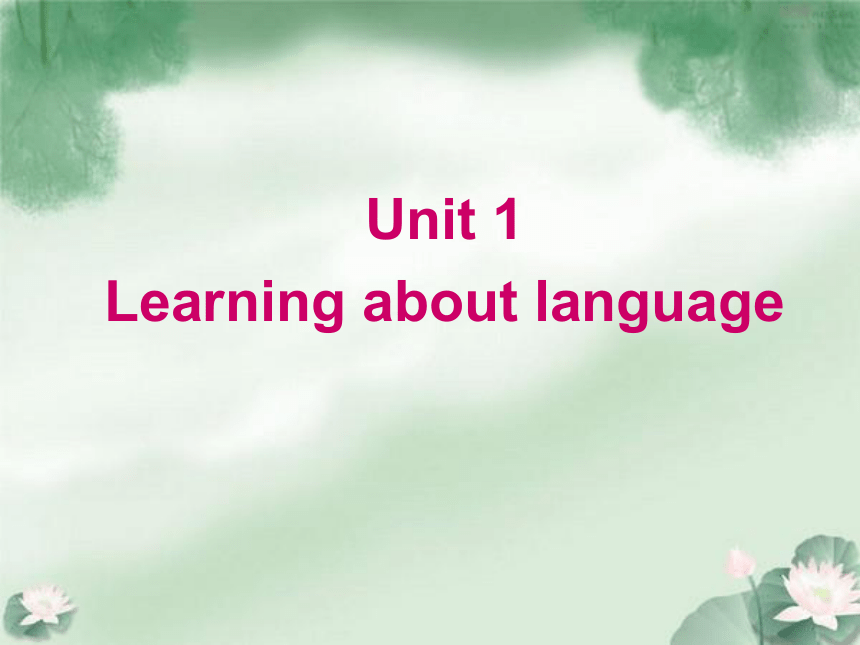 | |
| 格式 | zip | ||
| 文件大小 | 1.3MB | ||
| 资源类型 | 教案 | ||
| 版本资源 | 人教版(新课程标准) | ||
| 科目 | 英语 | ||
| 更新时间 | 2020-03-21 15:21:57 | ||
图片预览

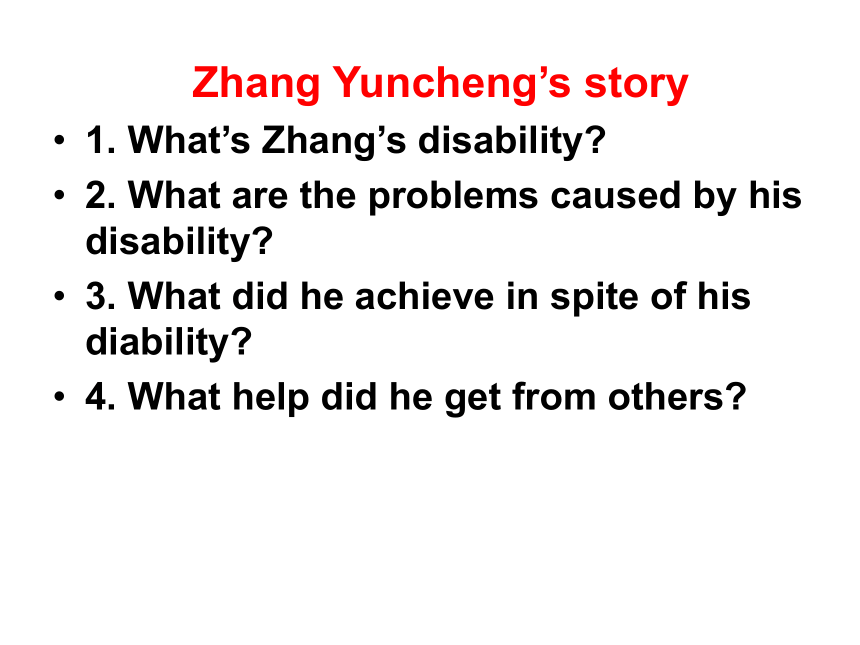
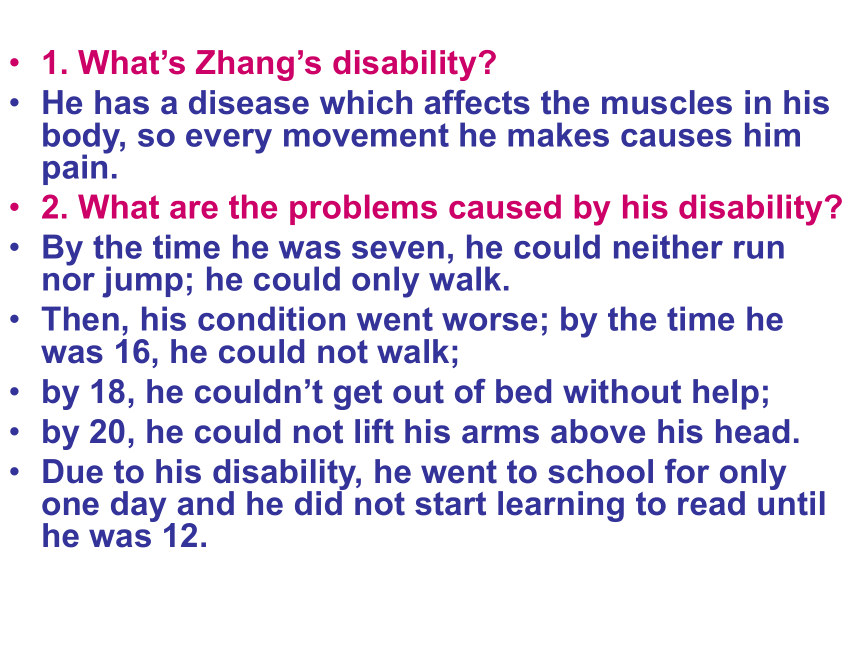
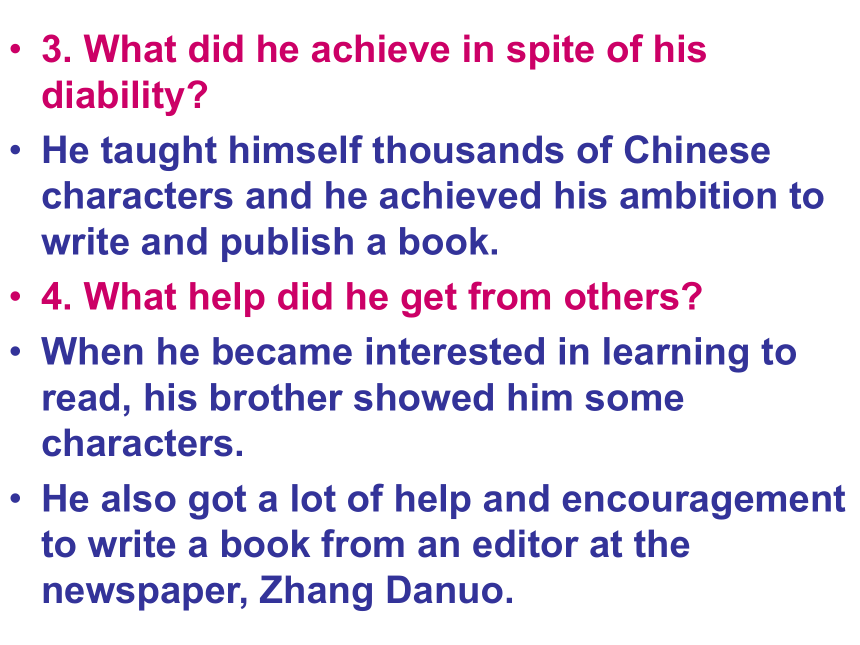
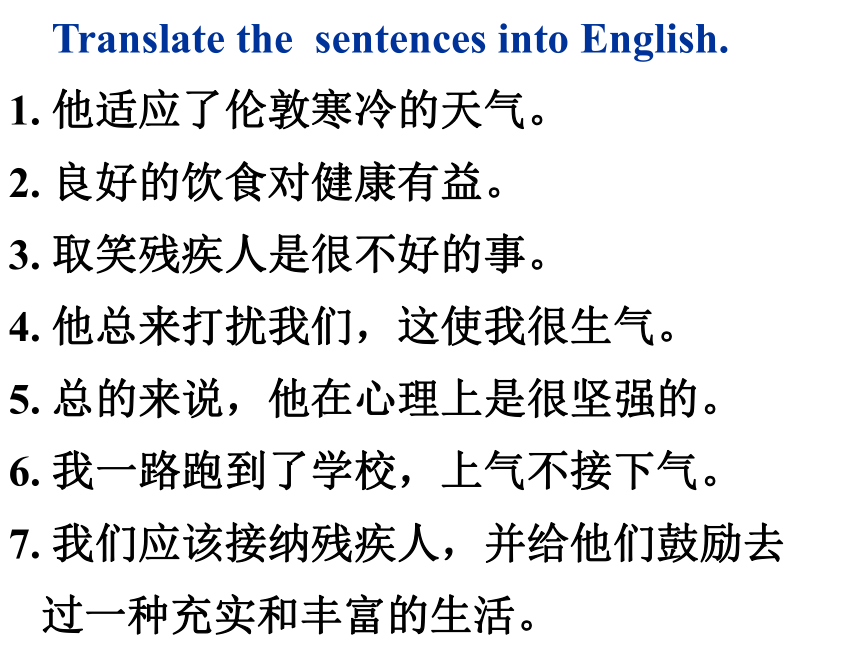
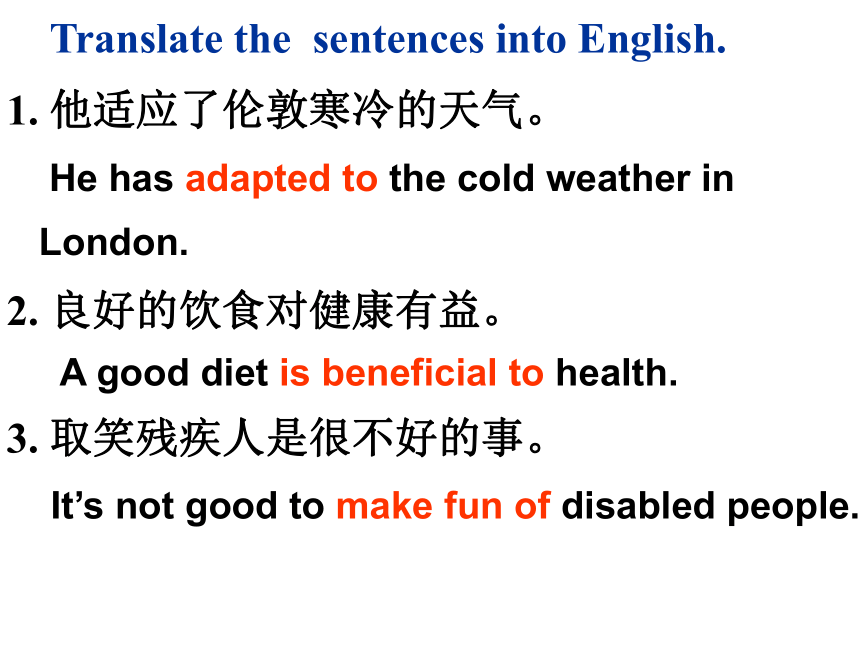
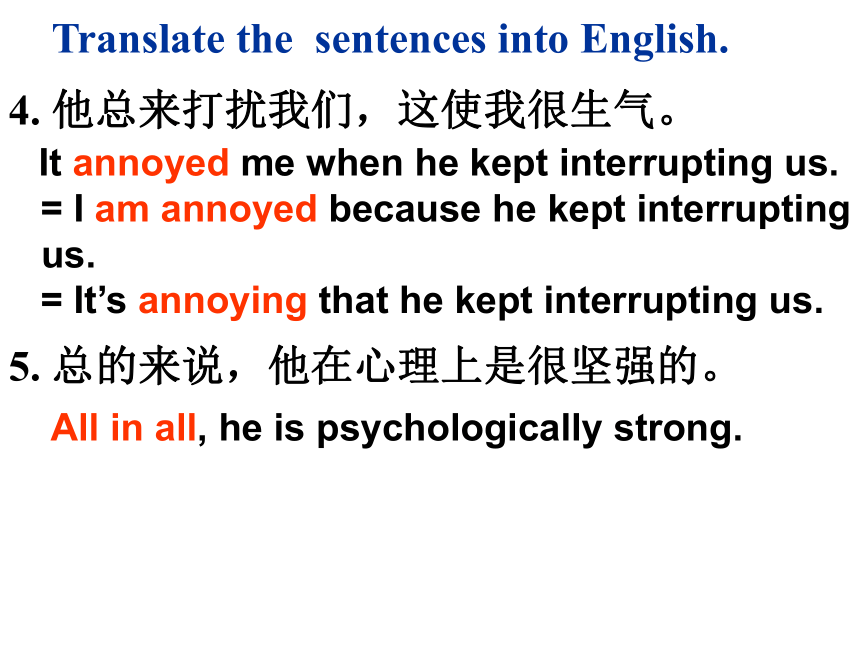
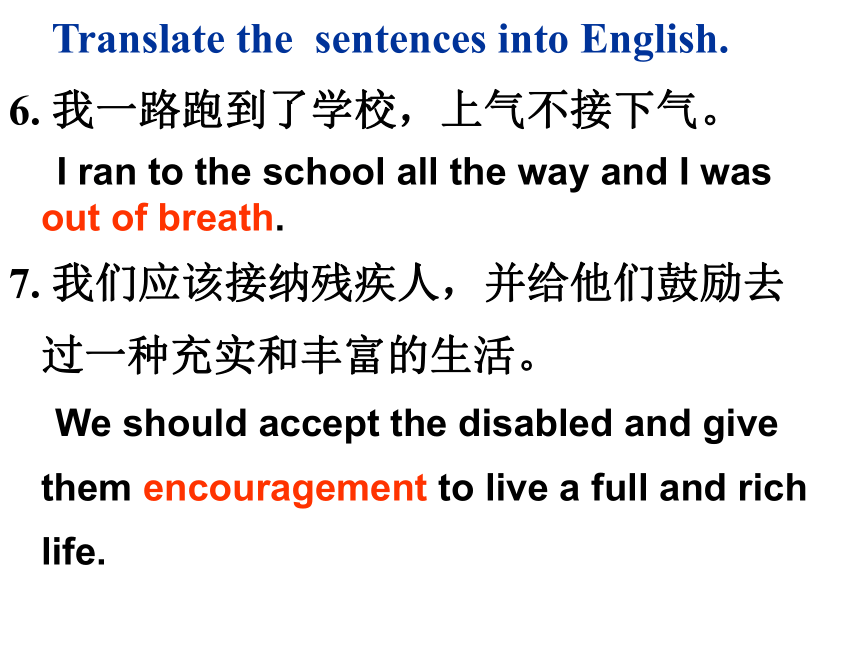
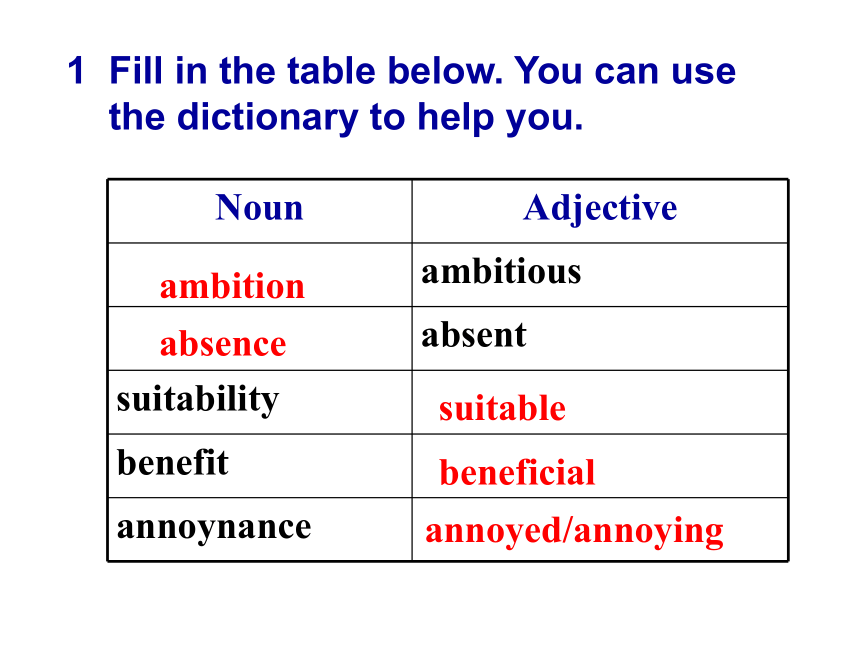
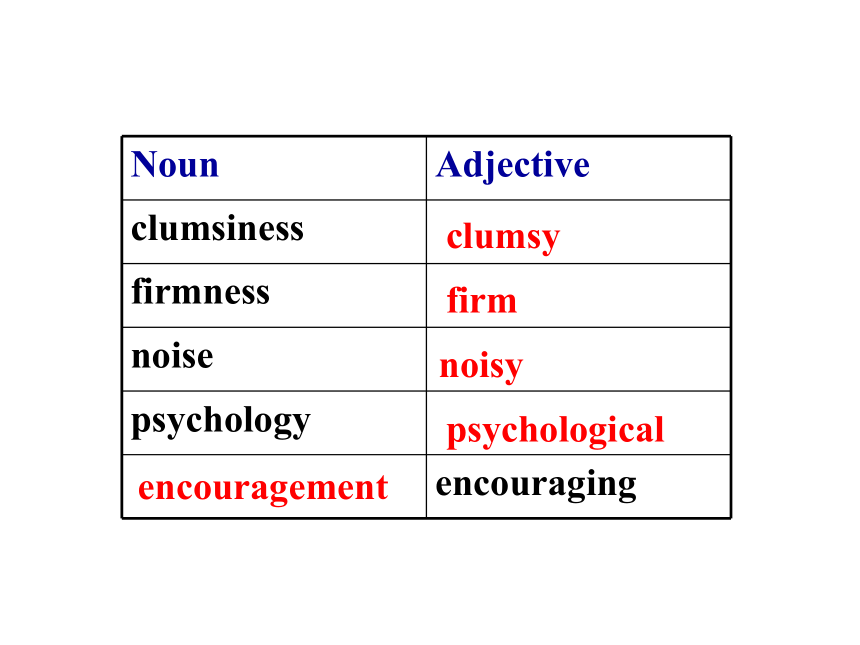
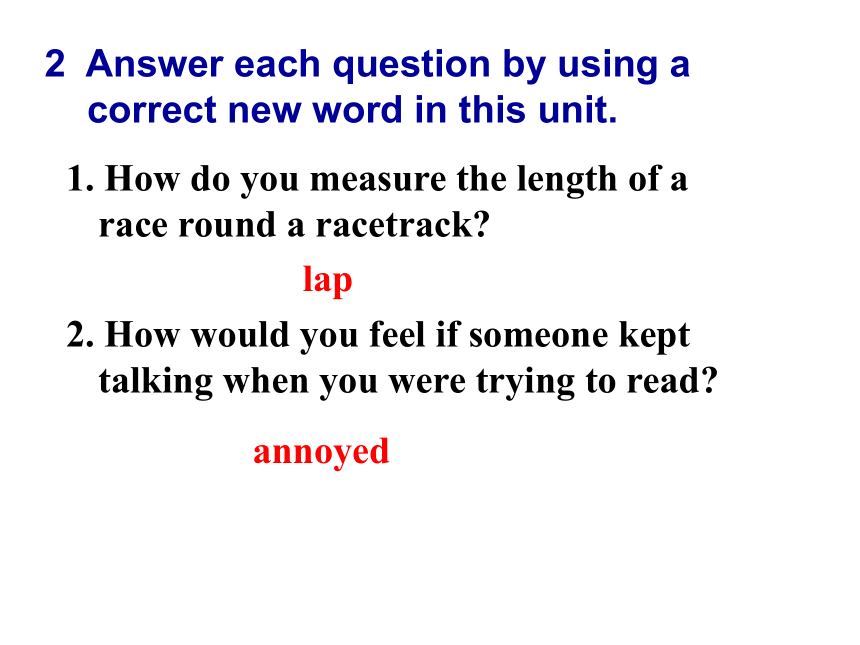
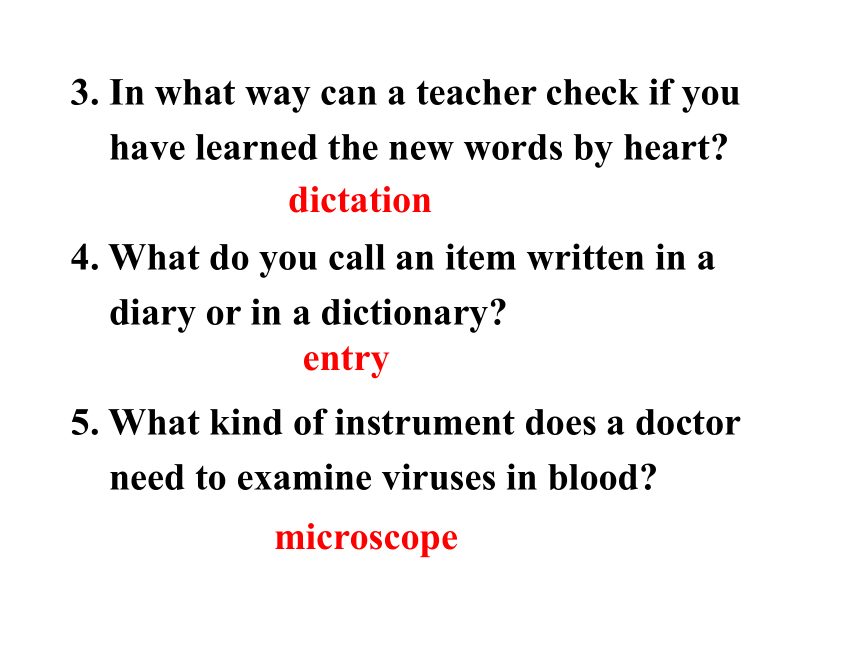
文档简介
(共42张PPT)
Unit 1
Learning about language
Zhang Yuncheng’s story
1. What’s Zhang’s disability?
2. What are the problems caused by his disability?
3. What did he achieve in spite of his diability?
4. What help did he get from others?
1. What’s Zhang’s disability?
He has a disease which affects the muscles in his body, so every movement he makes causes him pain.
2. What are the problems caused by his disability?
By the time he was seven, he could neither run nor jump; he could only walk.
Then, his condition went worse; by the time he was 16, he could not walk;
by 18, he couldn’t get out of bed without help;
by 20, he could not lift his arms above his head.
Due to his disability, he went to school for only one day and he did not start learning to read until he was 12.
3. What did he achieve in spite of his diability?
He taught himself thousands of Chinese characters and he achieved his ambition to write and publish a book.
4. What help did he get from others?
When he became interested in learning to read, his brother showed him some characters.
He also got a lot of help and encouragement to write a book from an editor at the newspaper, Zhang Danuo.
Translate the sentences into English.
他适应了伦敦寒冷的天气。
良好的饮食对健康有益。
取笑残疾人是很不好的事。
他总来打扰我们,这使我很生气。
总的来说,他在心理上是很坚强的。
我一路跑到了学校,上气不接下气。
我们应该接纳残疾人,并给他们鼓励去过一种充实和丰富的生活。
Translate the sentences into English.
他适应了伦敦寒冷的天气。
He has adapted to the cold weather in London.
2. 良好的饮食对健康有益。
A good diet is beneficial to health.
3. 取笑残疾人是很不好的事。
It’s not good to make fun of disabled people.
Translate the sentences into English.
4. 他总来打扰我们,这使我很生气。
It annoyed me when he kept interrupting us.
= I am annoyed because he kept interrupting us.
= It’s annoying that he kept interrupting us.
5. 总的来说,他在心理上是很坚强的。
All in all, he is psychologically strong.
Translate the sentences into English.
6. 我一路跑到了学校,上气不接下气。
I ran to the school all the way and I was out of breath.
7. 我们应该接纳残疾人,并给他们鼓励去过一种充实和丰富的生活。
We should accept the disabled and give them encouragement to live a full and rich life.
1 Fill in the table below. You can use
the dictionary to help you.
ambition
absence
suitable
beneficial
annoyed/annoying
Noun Adjective
ambitious
absent
suitability
benefit
annoynance
clumsy
firm
noisy
psychological
encouragement
Noun Adjective
clumsiness
firmness
noise
psychology
encouraging
1. How do you measure the length of a race round a racetrack?
2. How would you feel if someone kept talking when you were trying to read?
2 Answer each question by using a
correct new word in this unit.
lap
annoyed
3. In what way can a teacher check if you
have learned the new words by heart?
4. What do you call an item written in a
diary or in a dictionary?
5. What kind of instrument does a doctor
need to examine viruses in blood?
dictation
entry
microscope
6. How do you describe someone who is happy to meet new people?
7. What do you call students in the same year
group and the same situation as you?
8. What do you call the behaviour of one
student to others?
outgoing
fellow
conduct
adapt to cut out in other words
out of breath sit around in many ways
make fun of all in all
3 Complete this passage using the words below.
There was a time when children with mental
disabilities were prevented from living a normal
life _____________. They used to __________ in
their own homes after being educated in special
schools.
in many ways
sit around
Other people sometimes ___________ them. But now
things are changing. There are training programmes
for young people with mental disabilities, which have
proved very beneficial. Students like Xie Li, mentally
disabled from birth, now have a chance to become
athletes. But it is a challenge. She has to __________
training programmes as well as mixing with other
able-bodied athletes.
make fun of
adapt to
“Xie Li’s confidence has grown,” said her father.
“She looks much better and is not so often
___________ after her training. ________ her
mother and I are very happy with her progress.”
So, instead of ___________ mainstream activities,
mentally disabled students can become part of the
mainstream. ______________ they can lead a more
fulfilling life.
In other words
out of breath
All in all
cutting out
Ⅰ&Ⅱ
1. absence
2. microscope
3. hearing
4. dictation
5. psychology
6. outgoing
1. disabled
disability
2. ambition
ambitious
3. suiting
suitable
4. noise
noisy
Ⅲ-Ⅴ
1. beneficial
2. encouragement
3. annoyed
1. overcome difficulties
2. break a record
3. lead/live a busy life
4. develop computer software
5. 一个智障男子
6. 百万分之一
1. at
2. around
3. in
4. at
5. about/of
English Weekly
1. They have the same opinion in many ways.
2. Every time our parents come to visit our school, Mary will conduct them into the classrooms.
3. He has not adapted to the smell of his new house.
4. I was out of breath after running for the bus.
(1).不定式作主语
(往往放在谓语之后,用it作形式主语.)
To see is to believe.
It’s impossible for humans to fly
like a bird now.
(2).在be动词之后 不定式作表语
protect the world.
He likes to______________.
I find it still necessary (for him)
to ___________ if he wants to win.
(3) 在动词之后 不定式作宾语
play basketball
The teacher told me to____________
I expect you to____________.
(4). 不定式作宾补
hand in my papers
give me some help
The teacher told me to clean the blackboard.
I expect you to give me some help.
引导不定式作宾补的动词:
五看
watch
see
look at
observe
notice
三使
let
make
have
二听
listen to
hear
一感觉:
feel
ask
+sb to do sth
+ sb do sth
(省略to)
I have something to say,
but my brother has a lot of homework _____,
so I am looking for someone __________.
(5).不定式作定语
不定式作定语时,
应放在被修饰词的后面,
而且放在其他后置定语之后。
I got up early to______________.
I came here to___________.
(6) 表目的 不定式作状语
in order to ,
so as to ,
enough to ,
only to ,
too….to.,
catch the train
To tell the truth, I am not happy at the moment.
(7).独立结构
to be frank,
to be honest,
to tell the truth
He didn’t know
____________.
(8) . 与疑问词等连用
what to say
不定式与疑问词who,which, when, how, what 等连用,在句中起名词作用,可充当主语、表语、宾语等。
He didn’t know what to say.(宾语)
How to solve the problem is very important.(主语) My question is when to start. (表语)
结构 : to do;(否定) not to do
二. 时态
不定式
to do
to be doing
to have done
to have been
doing
时态
一般式
进行式
完成式
完成进行式
(1).They pretended not to see us.
(2). He pretended to be sleeping.
(3).She pretended to have known it before.
(一般式表示与谓语的动作同时/几乎同时/发生在
它之后.)
(进行式表示在谓语动词发生的同时,不定式的动作
也正在进行)
(完成式表示动作发生在谓语动作之前)
(4).We’re happy to have been working with
you.
(完成进行式表示谓语动作发生之前,不定式的
动作一直在进行而且可能之后也继续)
Phrases and sentence structures:
1. She is proud to have taken part in competitions and to have broken a record by running two laps this year.她很骄傲最近她代表她的国家参加了一次运动比赛,并赢得50米赛跑的金牌.
1) “to have taken part”是不定式__________, 表示不定式的动作发生在谓语动词is proud之___
的完成式
前
Do you know where Mount Kilimanjaro is?
Barry and his team wanted to ______________
_____________________________________
_____________________________________
prove that they could achieve whatever they decided to do and at the same time raise money for people with weak sight.
Joan thinks Barry's plan is amazing because _______________________________________________________________
after climbing one difficult mountain he wants to climb an even more difficult one.
Interview with Barry Minto
Age of the weak-sighted and blind climbers ___________
Age of the sighted companions ____________
Height of Mount Kilimanjaro _____________
Number in the disabled group__________
Number of the disabled who reached the top of mountain ________
Listen to the interview again and complete the notes below.
16-19 years old
25-45 years old
5,900 meters
12
9
Number in the sighted
group___________
Number of the sighted
who reached the top______
Number of the days to
climb the mountain ______
Number of the days to
come down the mountain
_____
15
7
5 days
2 days
Ex.5
Well done!
Five days; two
full of; companions
What do you plan to do next?
Amazing.
every success in the future
What kind of difficulty do you think weak-sighted or blind people would have climbing a mountain?
? walk over rough ground
? be too close to the edge of something dangerous
? have difficulties putting up the tents
? could only listen to their sighted companions’
instructions
In what ways do you think the sighted climbers helped them?
? act as their eyes
? walk beside them and give instructions
? may lead them by the hand
? help them put up the tents and have food
…
Unit 1
Learning about language
Zhang Yuncheng’s story
1. What’s Zhang’s disability?
2. What are the problems caused by his disability?
3. What did he achieve in spite of his diability?
4. What help did he get from others?
1. What’s Zhang’s disability?
He has a disease which affects the muscles in his body, so every movement he makes causes him pain.
2. What are the problems caused by his disability?
By the time he was seven, he could neither run nor jump; he could only walk.
Then, his condition went worse; by the time he was 16, he could not walk;
by 18, he couldn’t get out of bed without help;
by 20, he could not lift his arms above his head.
Due to his disability, he went to school for only one day and he did not start learning to read until he was 12.
3. What did he achieve in spite of his diability?
He taught himself thousands of Chinese characters and he achieved his ambition to write and publish a book.
4. What help did he get from others?
When he became interested in learning to read, his brother showed him some characters.
He also got a lot of help and encouragement to write a book from an editor at the newspaper, Zhang Danuo.
Translate the sentences into English.
他适应了伦敦寒冷的天气。
良好的饮食对健康有益。
取笑残疾人是很不好的事。
他总来打扰我们,这使我很生气。
总的来说,他在心理上是很坚强的。
我一路跑到了学校,上气不接下气。
我们应该接纳残疾人,并给他们鼓励去过一种充实和丰富的生活。
Translate the sentences into English.
他适应了伦敦寒冷的天气。
He has adapted to the cold weather in London.
2. 良好的饮食对健康有益。
A good diet is beneficial to health.
3. 取笑残疾人是很不好的事。
It’s not good to make fun of disabled people.
Translate the sentences into English.
4. 他总来打扰我们,这使我很生气。
It annoyed me when he kept interrupting us.
= I am annoyed because he kept interrupting us.
= It’s annoying that he kept interrupting us.
5. 总的来说,他在心理上是很坚强的。
All in all, he is psychologically strong.
Translate the sentences into English.
6. 我一路跑到了学校,上气不接下气。
I ran to the school all the way and I was out of breath.
7. 我们应该接纳残疾人,并给他们鼓励去过一种充实和丰富的生活。
We should accept the disabled and give them encouragement to live a full and rich life.
1 Fill in the table below. You can use
the dictionary to help you.
ambition
absence
suitable
beneficial
annoyed/annoying
Noun Adjective
ambitious
absent
suitability
benefit
annoynance
clumsy
firm
noisy
psychological
encouragement
Noun Adjective
clumsiness
firmness
noise
psychology
encouraging
1. How do you measure the length of a race round a racetrack?
2. How would you feel if someone kept talking when you were trying to read?
2 Answer each question by using a
correct new word in this unit.
lap
annoyed
3. In what way can a teacher check if you
have learned the new words by heart?
4. What do you call an item written in a
diary or in a dictionary?
5. What kind of instrument does a doctor
need to examine viruses in blood?
dictation
entry
microscope
6. How do you describe someone who is happy to meet new people?
7. What do you call students in the same year
group and the same situation as you?
8. What do you call the behaviour of one
student to others?
outgoing
fellow
conduct
adapt to cut out in other words
out of breath sit around in many ways
make fun of all in all
3 Complete this passage using the words below.
There was a time when children with mental
disabilities were prevented from living a normal
life _____________. They used to __________ in
their own homes after being educated in special
schools.
in many ways
sit around
Other people sometimes ___________ them. But now
things are changing. There are training programmes
for young people with mental disabilities, which have
proved very beneficial. Students like Xie Li, mentally
disabled from birth, now have a chance to become
athletes. But it is a challenge. She has to __________
training programmes as well as mixing with other
able-bodied athletes.
make fun of
adapt to
“Xie Li’s confidence has grown,” said her father.
“She looks much better and is not so often
___________ after her training. ________ her
mother and I are very happy with her progress.”
So, instead of ___________ mainstream activities,
mentally disabled students can become part of the
mainstream. ______________ they can lead a more
fulfilling life.
In other words
out of breath
All in all
cutting out
Ⅰ&Ⅱ
1. absence
2. microscope
3. hearing
4. dictation
5. psychology
6. outgoing
1. disabled
disability
2. ambition
ambitious
3. suiting
suitable
4. noise
noisy
Ⅲ-Ⅴ
1. beneficial
2. encouragement
3. annoyed
1. overcome difficulties
2. break a record
3. lead/live a busy life
4. develop computer software
5. 一个智障男子
6. 百万分之一
1. at
2. around
3. in
4. at
5. about/of
English Weekly
1. They have the same opinion in many ways.
2. Every time our parents come to visit our school, Mary will conduct them into the classrooms.
3. He has not adapted to the smell of his new house.
4. I was out of breath after running for the bus.
(1).不定式作主语
(往往放在谓语之后,用it作形式主语.)
To see is to believe.
It’s impossible for humans to fly
like a bird now.
(2).在be动词之后 不定式作表语
protect the world.
He likes to______________.
I find it still necessary (for him)
to ___________ if he wants to win.
(3) 在动词之后 不定式作宾语
play basketball
The teacher told me to____________
I expect you to____________.
(4). 不定式作宾补
hand in my papers
give me some help
The teacher told me to clean the blackboard.
I expect you to give me some help.
引导不定式作宾补的动词:
五看
watch
see
look at
observe
notice
三使
let
make
have
二听
listen to
hear
一感觉:
feel
ask
+sb to do sth
+ sb do sth
(省略to)
I have something to say,
but my brother has a lot of homework _____,
so I am looking for someone __________.
(5).不定式作定语
不定式作定语时,
应放在被修饰词的后面,
而且放在其他后置定语之后。
I got up early to______________.
I came here to___________.
(6) 表目的 不定式作状语
in order to ,
so as to ,
enough to ,
only to ,
too….to.,
catch the train
To tell the truth, I am not happy at the moment.
(7).独立结构
to be frank,
to be honest,
to tell the truth
He didn’t know
____________.
(8) . 与疑问词等连用
what to say
不定式与疑问词who,which, when, how, what 等连用,在句中起名词作用,可充当主语、表语、宾语等。
He didn’t know what to say.(宾语)
How to solve the problem is very important.(主语) My question is when to start. (表语)
结构 : to do;(否定) not to do
二. 时态
不定式
to do
to be doing
to have done
to have been
doing
时态
一般式
进行式
完成式
完成进行式
(1).They pretended not to see us.
(2). He pretended to be sleeping.
(3).She pretended to have known it before.
(一般式表示与谓语的动作同时/几乎同时/发生在
它之后.)
(进行式表示在谓语动词发生的同时,不定式的动作
也正在进行)
(完成式表示动作发生在谓语动作之前)
(4).We’re happy to have been working with
you.
(完成进行式表示谓语动作发生之前,不定式的
动作一直在进行而且可能之后也继续)
Phrases and sentence structures:
1. She is proud to have taken part in competitions and to have broken a record by running two laps this year.她很骄傲最近她代表她的国家参加了一次运动比赛,并赢得50米赛跑的金牌.
1) “to have taken part”是不定式__________, 表示不定式的动作发生在谓语动词is proud之___
的完成式
前
Do you know where Mount Kilimanjaro is?
Barry and his team wanted to ______________
_____________________________________
_____________________________________
prove that they could achieve whatever they decided to do and at the same time raise money for people with weak sight.
Joan thinks Barry's plan is amazing because _______________________________________________________________
after climbing one difficult mountain he wants to climb an even more difficult one.
Interview with Barry Minto
Age of the weak-sighted and blind climbers ___________
Age of the sighted companions ____________
Height of Mount Kilimanjaro _____________
Number in the disabled group__________
Number of the disabled who reached the top of mountain ________
Listen to the interview again and complete the notes below.
16-19 years old
25-45 years old
5,900 meters
12
9
Number in the sighted
group___________
Number of the sighted
who reached the top______
Number of the days to
climb the mountain ______
Number of the days to
come down the mountain
_____
15
7
5 days
2 days
Ex.5
Well done!
Five days; two
full of; companions
What do you plan to do next?
Amazing.
every success in the future
What kind of difficulty do you think weak-sighted or blind people would have climbing a mountain?
? walk over rough ground
? be too close to the edge of something dangerous
? have difficulties putting up the tents
? could only listen to their sighted companions’
instructions
In what ways do you think the sighted climbers helped them?
? act as their eyes
? walk beside them and give instructions
? may lead them by the hand
? help them put up the tents and have food
…
